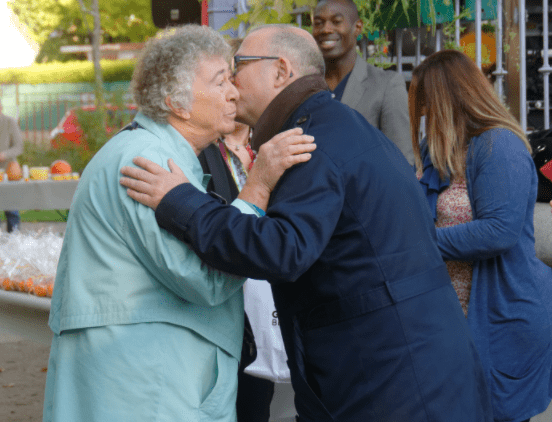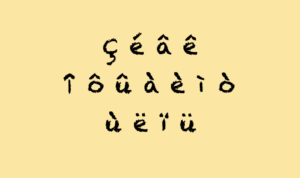5 Must Learn French Greetings
First impressions matter. Especially if you’re in France. Knowing how to say hello and goodbye in French is crucial to achieving fluency in the language. And while pronouncing “bonjour” right may seem like a small task, there are plenty more greetings in the French language. Discover all the greetings in French, and make your introductions memorable.
The Typical French Cheek Kiss Greeting
Cheek kissing called “la bise” is very common in France. Although it’s mostly reserved for women, men who are close friends can also do it. However, the cheek kissing rules vary depending on the country and the region that you are visiting. In Belgium, for example, you should greet everyone younger than you are or in the same generation with a single kiss. People older than you receive three kisses, starting with the right cheek. In France, the number of cheek kisses varies based on regions. This funny map will show you how many kisses are traditionally given. The usual is two, but some provinces give up to four.
This is quite confusing, especially if you are visiting these countries for the first time. The good news is that when you meet a French person for the first time, shaking hands is acceptable. Be keen and learn how other people are interacting, and you should be able to quickly determine the cheek kiss standard of the region you are staying in.

Learn How to Say Hello in French
Below are French greetings that you’ll find useful if you want to say hello to anyone in France. Don’t worry about your accent or pronunciation. It’s more important that you try at first. Give these French hellos a go, and impress the locals quickly.
Bonjour – Hello!
This is the easiest French greeting, and it works both in a formal and informal setting. If you’re learning French, it’s probably the first greeting you encounter. In the evening, replace bonjour with bonsoir (good evening). Depending on the time, bonjour or bonsoir is a perfect greeting for people you meet for the first time.
Salut! – Hi!
This French greeting is for the people you often see or know well. It is an informal greeting, and you should not use it in a formal setting.
Coucou! – Hey there!
This is a very informal greeting. You should only use it when addressing close friends and family. If you use it in formal settings, you may attract many stares, ending up embarrassed.
Quoi de neuf? – What’s Up?
While this is an informal greeting, it’s more often used as a conversation starter in French.
Allô? – Hello?
This is only used over the phone to establish whether a person is on the line. You can also use it to get the attention of a person who has not heard you.
Saying Goodbye in French
The following are customary goodbye French phrases.
Au revoir! – Goodbye!
This is a standard salutation and is acceptable in both formal and informal settings. Individuals in the French-speaking countries consider it rude if you leave a room or hang up the phone without using the phrase.
Salut! – Bye-bye!
Confusing, right? This greeting can be used to say both bye and hi. It is also an informal way of saying bye, and you should not use it when in a formal setting.

Ciao! – See you!
Even though the phrase is Italian, it has gained popularity among young French speakers. It is mostly used in informal settings.
Je suis désolé(e), mais je dois y aller – I’m sorry, but I have to go
This phrase can be used in both an informal and formal setting. The main reason for using it is to emphasize on the urgency. The pronoun y should always come before aller if you have not mentioned the location you are going.
When the speaker is female, an extra “e” is added at the end. The pronunciation of the word does not change; however, it is a grammatical requirement of the language that is shown on paper.
À plus (tard)! – (See you) later!
“À plus tard” is standard is goodbye, and “À plus” the informal version. You can use it when you are sure that you will meet a person again, such as a friend or acquaintance, but you are not sure when that will be. If you use it in a formal setting, ensure that you know the person well enough, and you often meet them.
À tout à l’heure! – I’ll See You Later!
This is an expression to use when parting with friends, who you will meet again later in the day.
À demain! – I Will See you tomorrow!
You can replace the word “demain” with any other day of the week if you are certain that you will meet the individual soon. If you are uncertain about the exact day of the meeting, do not use a day of the week.
Asking “How are You?” or “How is it Going?” in French
Asking a person how they are doing is common in the US. You likely use this greeting when starting almost every conversation. French-speaking countries are also keen to use these pleasantries in their conversations. The following are the most common ways of asking how someone is doing:
- Comment ça va? – This means how is it going?
- Comment vas-tu? – Used in an informal setting to ask, “how are you?”
- Comment allez-vous? – Used in a formal setting to ask, “how are you?”
- Ça va? – Informal for “how is it going?”
There are many possible responses when someone asks how you are doing. The sample responses are as below.
- Ça va bien – I am doing well
- Tout va bien – Things are going well
- Je vais bien, merci. – I am fine, thanks
Once you have responded that you are fine, it is expected that you will ask how the person greeting you is doing. If you are in an informal setting, you can ask, “Et toi?” or if you are in a formal setting, you can ask, “Et vous?” Both mean “and you?”

Know About Other French Greetings
Other than good morning, good evening, or how are you doing? Other phrases are also quite useful. Some of them are:
Enchanté(e) – Pleasure Meeting You
In a formal setting, it is courteous to indicate that you are happy to meet an individual after introducing themselves. This is the perfect phrase for doing so.
Ça fait longtemps, dis donc – It’s Been a While
This is a common greeting used by old friends.
Rules for French Greetings
Here are the most basic rules of greeting people in France you should know:
- Always do it: Not greeting someone is very impolite in French etiquette. Make sure you never forget it if you know the person. Or, when you enter a shop, make sure you greet or reciprocate a greeting with the shop assistants.
- Don’t hug: Hugs are only for close friends and family. Unless specifically requested by your French friend, don’t hug them.
- Cheek kisses only for friends: Cheek kisses are very common, but you can wait for the French person you’re meeting to initiate them.
- Shake hands: Handshakes are customary in formal business settings. And when you meet someone for the first time, feel free to introduce yourself with a firm but not too enthusiastic handshake.
- Use French: When you’re greeting someone in France, make sure you say it in French. It’s crucial to show that you’re polite and well mannered, and it shows your appreciation for the culture. You’ll surely receive better customer service if you use these greetings in French.
Learn French with More Than Greetings
Learning these French greetings is the first step in learning French. It’s some of the most common forms of communication in a foreign language. And if you’d like to continue your journey with only the most useful French phrases, you need OptiLingo.
OptiLingo is a convenient language learning app that actually brings you results. Forget learning awkward and unnecessary vocabulary. Learn French and reach fluency quickly with only the essentials. OptiLingo focuses on the best methods to bring you an enjoyable language learning experience. Download the app today to discover how effective learning French can be!







